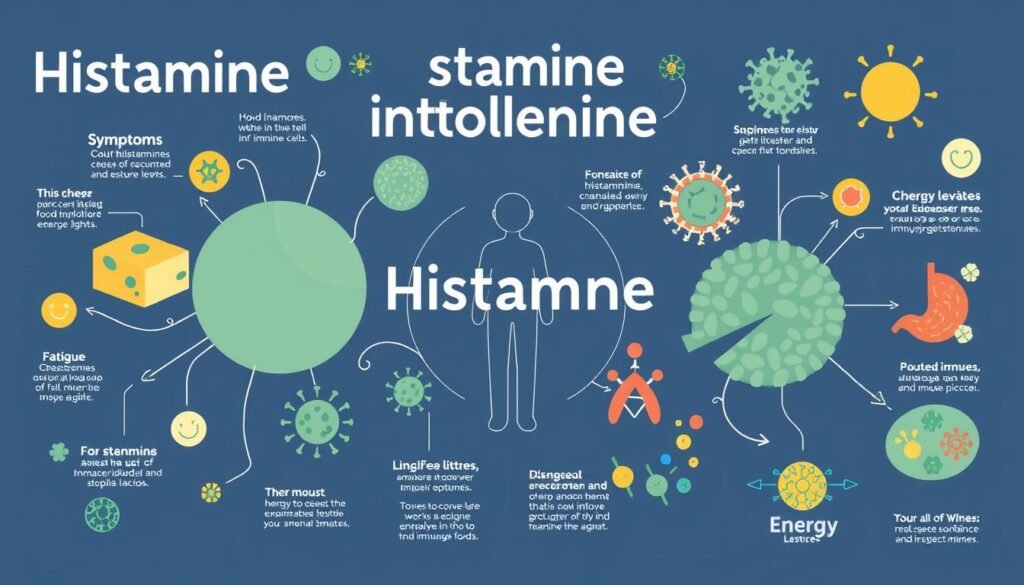Did you know that as we age, our bodies find it harder to respond to histamines? This makes us more prone to allergies and some brain disorders. Histamines are vital chemicals that send messages within our immune system. They deeply affect our energy levels.
These substances play key roles in processes like inflammation and sleep. Knowing how they work helps us understand their effect on our health. Especially, how our immune system’s activation may make us feel tired or sluggish.
Key Takeaways
- Histamines play a crucial role in the immune system response.
- Aging may affect histamine receptor activity and contribute to health issues.
- Histamines influence energy levels, potentially leading to fatigue.
- Diverse histamine receptors are located throughout the body, affecting various functions.
- Understanding histamines can provide insights into managing energy levels and allergies.
Understanding Histamines
Histamines play a big role in our bodies, impacting many bodily functions. They’re mainly produced by mast cells and basophils. As part of the immune response, they help fight off allergens and pathogens, causing inflammation.
What are Histamines?
Histamines come from the amino acid called histidine, which we must get from foods. Found mostly in the brain, they exist in about 64,000 histaminergic neurons, particularly in the tuberomammillary nucleus. Thus, they significantly affect things like how neurons talk to each other and their activity levels.
The Role of Histamines in the Body
When the body reacts to harmful substances, histamines help by making blood vessels more permeable. This allows white blood cells to reach and treat inflamed tissues easier, causing symptoms like swelling and redness. Histamines work with four types of receptors (H1, H2, H3, and H4) to manage both pro-inflammatory and anti-inflammatory reactions. To really understand the effects of histamines on our health, especially when it comes to histamine intolerance, you can learn more
Histamines and the Immune Response
The immune response involves a lot of cells and signals. Histamines play a key role in it. They come mainly from mast cells when allergens or other substances enter the body. Their release causes reactions that fight off pathogens and cause inflammation.
Mechanisms of Histamine Release
Mast cells release most histamines in our bodies. They release histamines into tissues when they meet allergens. This process involves different receptors: H1R, H2R, H3R, and H4R. Each type has its own role in the immune response:
- H1R activation: Enhances the chemotaxis of eosinophils and neutrophils, promoting their migration to areas of inflammation.
- H2R activation: Regulates diverse functions such as gastric acid secretion and inhibits leukotriene synthesis through signaling pathways.
- H3R functions: Operates primarily within the central nervous system, influencing the release of neurotransmitters and regulating metabolic processes.
- H4R roles: Involved in recruiting immune cells and stimulating inflammatory responses, particularly in allergic conditions.
How Histamines Contribute to Inflammation
Histamines are key in causing inflammation. They help in cytokine production and guide immune cell actions. Their interaction with receptors leads to signals that release cytokines like IL-4, IL-5, IL-10, and IL-13. These cytokines are vital for managing the immune response.
Aging can lower the activity of histamine receptors. This can weaken the immune system. It might make people more prone to infections and allergies. Studies show that blocking H4R might help treat excessive inflammation, allergies, and even cancer.
| Histamine Receptor | Primary Functions | Impact on Immune Response |
|---|---|---|
| H1R | Cellular migration, vasodilation | Increases chemotaxis of immune cells to inflammation sites |
| H2R | Gastric acid secretion, cardiac function | Inhibits leukotriene synthesis in neutrophils |
| H3R | Neurotransmitter regulation | Impacts insulin resistance and potential weight management |
| H4R | Recruitment of immune cells | Stimulates inflammatory cytokine release, contributing to allergic responses |
The Dual Role of Histamines
Histamines are key players in our immune system. They can start inflammation but also help control various body processes. Knowing how they work is key to treating conditions related to histamine.
Pro-inflammatory Effects of Histamines
Histamines are known for causing inflammation. They do this by working with special histamine receptors. One type, the H1 receptors, makes blood vessels more permeable. This helps immune cells reach damaged or infected tissues.
This inflammation is essential for fighting off infections. But it can harm tissues if it goes on for too long.
Regulatory Functions of Histamines
However, not all histamine receptors cause inflammation. Some, like H2 and H4, help regulate our immune response. They ensure everything stays balanced. H2 receptors, for example, control stomach acid and affect our brain’s neurotransmitters.
Despite their role in inflammation, histamines help balance and heal our bodies. They play a crucial part in controlling inflammation and aiding recovery.
| Histamine Receptor | Function | Role in Regulation |
|---|---|---|
| H1R | Pro-inflammatory response | Promotes inflammation and immune cell recruitment |
| H2R | Modulation of gastric acid secretion | Balances immune responses and promotes healing |
| H3R | Neurological functions | Regulates cognition, mood, and sleep |
| H4R | Regulatory functions | Modulates immune system response |
The balance between causing and controlling inflammation shows how important histamines are. They offer clues for new treatments in many diseases.
Histamines and Energy Levels
Histamines are key in managing our energy through their effect on metabolism and sleep. They help us maintain strong physical and mental performance. By understanding this, we can perform better every day.
Impact on Energy Metabolism
Histamines come from histidine, thanks to an enzyme called L-histidine decarboxylase. Other enzymes, like diamine oxidase, also play a role. When histamine receptors are activated, they boost our metabolism. This happens through neurotransmitters and making vital compounds.
This boost, especially from H1R, strengthens immune cells. Stronger immune cells can fight fatigue better. This improves our health and energy levels.
How Histamines Affect Sleep and Wakefulness
Histamines help us stay awake by acting on our sleep. They target the H3 receptors in our brain. This triggers the release of histamine and other neurotransmitters that affect our sleep patterns.
When our histamine levels are off, it can mess with our sleep. Poor sleep leads to low energy and worse brain function. Keeping histamine levels balanced is key. It helps us get good sleep and keeps our energy up during the day.

Allergies, Histamines, and Energy
Allergies take a toll on our energy because of how our bodies react. About 1 in 4 adults and 1 in 5 kids deal with seasonal allergies. These can cause a variety of symptoms. They range from mild annoyances like feeling tired and getting itchy eyes to serious issues that affect breathing.
Connection Between Allergies and Fatigue
Many people with allergies feel really tired, a condition known as allergy fatigue. This tiredness comes from our body fighting against things like pollen or dust. When we come into contact with these, our bodies release chemicals called histamines. They mess with our sleep patterns. This leads to not sleeping well, which makes us feel exhausted during the day. Besides making us sneeze or have a stuffy nose and itchy eyes, these symptoms tire us out and make daily tasks hard.
Managing Allergy Symptoms for Better Energy
To feel energetic again, managing allergy symptoms is key. Finding out exactly what you’re allergic to helps a lot. It lets you avoid those triggers. Medicines like Zyrtec can also help calm down symptoms and reduce tiredness. Plus, sleeping better can make a big difference. Things like hypoallergenic sheets and air purifiers make our bedrooms better for sleep. Making some changes in our lives, like eating differently, exercising, and dealing with stress better, helps fight off tiredness from allergies in the long run.
Histamine Intolerance: What You Need to Know
Histamine intolerance affects many people, leading to symptoms that can mess up your day. It’s key to know the causes and symptoms to manage your health well. This issue happens when the body struggles to break down histamine. Then, too much histamine causes various negative reactions.
Symptoms and Causes of Histamine Intolerance
Those with histamine intolerance might face symptoms like:
- Itchy eyes
- Runny nose and nasal congestion
- Skin issues such as flushing or hives
- Bloating and digestive problems
- Headaches
- Changes in heart rate
Many factors can lead to histamine intolerance. Things like health issues, certain meds, and drinking a lot of alcohol can upset histamine balance. Foods high in histamine, like aged cheeses and fermented foods, along with veggies such as spinach and eggplant, make things worse. Genes and gut health also affect how your body handles histamine.

Managing Histamine Intolerance for Improved Health
To manage histamine intolerance, changing your diet and taking supplements can help a lot. Eating a low-histamine diet reduces symptoms. Also, supplements like diamine oxidase (DAO) can help balance things out. Foods full of vitamins B6, C, and minerals like copper and magnesium help break down histamine.
Doctors might suggest writing down what you eat to spot what triggers your symptoms. This helps figure out if you have histamine intolerance. Taking supplements and eating right can boost your health and energy. Then, you can handle histamine intolerance much better.
Immune System Response, Histamines, and Their Impact on Energy
The link between our immune system’s response and our energy levels is closely tied to histamines. These chemicals are key in many bodily processes. They tell us how histamines affect our immune system and why we often feel tired.
The Interplay Between Immune Function and Energy Levels
Histamines are released during immune responses, causing inflammation. This inflammation is connected to feeling tired because our energy goes into fighting off threats. Studies show that when histamine levels are high, our energy can drop.
People with allergies often feel tired, which is linked to histamine release. By changing what we eat to control histamine levels, we can feel less tired. For tips on this, check out this resource.
Case Studies Linking Histamines to Fatigue
Many studies link histamine changes to energy dips. For example, high histamine levels can mimic chronic fatigue syndrome, showing the connection between histamine and energy.
Histamines can activate certain brain cells, leading to the release of support factors for nerves. But, too much histamine can also stop the release of inflammation-causing factors, making fatigue worse.
It’s important to balance our histamines. This might mean changing our diet and taking supplements. To learn more about histamine problems, visit this site.
| Histamine Effects | Link to Immune System Response | Consequences for Energy Levels |
|---|---|---|
| Increased Histamine Release | Activates immune pathways | Leads to fatigue due to energy diversion |
| Activation of Astrocytes | Produces neurotrophic factors | Potentially reduces energy availability |
| Suppression of Pro-inflammatory Factors | Coordinates immune responses | Can lead to chronic fatigue symptoms |
Using Antihistamines
Antihistamines are key in controlling allergies and their symptoms. They work by blocking histamine receptors, mainly H1 and H2. This helps ease symptoms like sneezing, itching, and swelling. Using these drugs can improve a person’s energy and overall health when dealing with allergic reactions.
How Antihistamines Work
Antihistamines stop histamine from causing allergic reactions. They prevent histamine from reaching its receptors, reducing swelling and other allergic signs. A study at the University of Oregon’s Exercise and Environmental Physiology Lab shows that histamine helps in exercise recovery by aiding glucose and blood flow. However, antihistamines might hinder physical activities by affecting how the body processes glucose.
The Pros and Cons of Antihistamine Use
The perks of using antihistamines include:
- Relief from allergy symptoms.
- Better life quality for seasonal allergy sufferers.
- Reducing mental fog tied to allergies in the short term.
But, there are cons to keep in mind:
- First-generation antihistamines may make you sleepy and tired.
- Using them a lot may harm memory and cause confusion.
- They can mess with how well you do in physical activities by impacting glucose use.
Knowing these facts can help people balance allergy control with staying active and sharp.

Diamine Oxidase and Histamine Regulation
Diamine oxidase (DAO) is key in managing histamine in the body. It breaks down histamine to keep things balanced and avoid problems. If DAO levels drop, too much histamine can build up. This leads to issues like tiredness and stomach problems. Knowing how DAO works with histamine helps those with histamine intolerance feel more energetic.
Role of Diamine Oxidase in Histamine Breakdown
DAO is made mostly in the intestines’ mucous membranes. It’s also active in the kidneys and placenta. This enzyme breaks down histamine from food, stopping too much from getting into the blood. Without enough DAO, controlling histamine becomes hard. Low DAO can come from genetic issues, hormone changes, or what you eat.
Link Between DAO and Energy Levels
There’s a clear link between managing histamine and having energy.
When DAO is low, histamine can’t be broken down well. This affects the body, making you feel tired. Helping DAO work better might boost your energy. Eating right and possibly adding zinc and B vitamins could help. For more on managing histamine, check out this detailed review.
Conclusion
Histamines play a big role in our health, interacting with our immune system. They do two main things: cause inflammation and help regulate the body. It’s key to understand their effects to manage energy and stay healthy.
A balanced diet and staying hydrated are super important. They help avoid issues that can mess with energy levels. Eating foods full of nutrients helps keep histamines in check. This boosts your immune system and your energy.
Knowing how histamines affect you helps make better health decisions. This knowledge encourages choosing the best ways to handle immune responses and energy. For more info on food and energy, check out this link here.